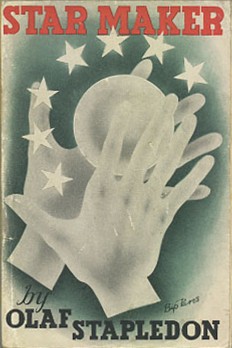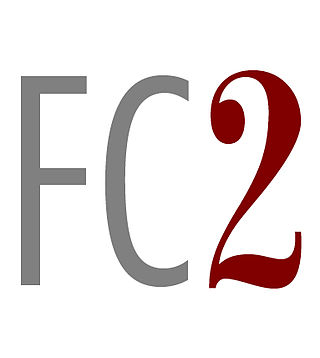
Cosmicomics is a collection of twelve short stories by Italo Calvino first published in Italian in 1965 and in English in 1968. The stories were originally published between 1964 and 1965 in the Italian periodicals Il Caffè and Il Giorno. Each story takes a scientific theory, and builds an imaginative story around it. An always-extant being called Qfwfq explicitly narrates all of the stories save two. Every story is a memory of an event in the history of the universe.
The Galactic Empire series is a science fiction sequence of three of Isaac Asimov's earliest novels, and extended by one short story. They are connected by their early place in his published works and chronological placement within his overarching Foundation universe, set around the rise of Asimov's Galactic Empire, between the Robot and Foundation series to which they were linked in Asimov's later novels.

A first-person narrative is a mode of storytelling in which a storyteller recounts events from that storyteller's own personal point of view, using first-person grammar such as "I", "me", "my", and "myself". It must be narrated by a first-person character, such as a protagonist, re-teller, witness, or peripheral character. Alternatively, in a visual storytelling medium, the first-person perspective is a graphical perspective rendered through a character's visual field, so the camera is "seeing" out of a character's eyes.

Cat's Cradle is a satirical postmodern novel, with science fiction elements, by American writer Kurt Vonnegut. Vonnegut's fourth novel, it was first published on March 18, 1963, exploring and satirizing issues of science, technology, the purpose of religion, and the arms race, often through the use of morbid humor.
Metafiction is a form of fiction that emphasizes its own narrative structure in a way that inherently reminds the audience that they are reading or viewing a fictional work. Metafiction is self-conscious about language, literary form, and story-telling, and works of metafiction directly or indirectly draw attention to their status as artifacts. Metafiction is frequently used as a form of parody or a tool to undermine literary conventions and explore the relationship between literature and reality, life, and art.

Star Maker is a science fiction novel by British writer Olaf Stapledon, published in 1937. Continuing the theme of the author's previous book, Last and First Men (1930)—which narrated a history of the human species over two billion years—it describes a history of life in the universe, dwarfing the scale of the earlier work. Star Maker tackles philosophical themes such as the essence of life, of birth, decay and death, and the relationship between creation and creator. A pervading theme is that of progressive unity within and between different civilisations.
Narration is the use of a written or spoken commentary to convey a story to an audience. Narration is conveyed by a narrator: a specific person, or unspecified literary voice, developed by the creator of the story to deliver information to the audience, particularly about the plot: the series of events. Narration is a required element of all written stories, presenting the story in its entirety. It is optional in most other storytelling formats, such as films, plays, television shows and video games, in which the story can be conveyed through other means, like dialogue between characters or visual action.

Postmodern literature is a form of literature that is characterized by the use of metafiction, unreliable narration, self-reflexivity, intertextuality, and which often thematizes both historical and political issues. This style of experimental literature emerged strongly in the United States in the 1960s through the writings of authors such as Kurt Vonnegut, Thomas Pynchon, William Gaddis, Philip K. Dick, Kathy Acker, and John Barth. Postmodernists often challenge authorities, which has been seen as a symptom of the fact that this style of literature first emerged in the context of political tendencies in the 1960s. This inspiration is, among other things, seen through how postmodern literature is highly self-reflexive about the political issues it speaks to.

Vril: The Power of the Coming Race, originally published as The Coming Race, is a novel by Edward Bulwer-Lytton, published anonymously in 1871.
"The Approach to Al-Mu'tasim" is a fantasy short story written in 1935 by Argentine writer Jorge Luis Borges. In his autobiographical essay, Borges wrote about "The Approach to Al-Mu'tasim", "it now seems to me to foreshadow and even to set the pattern for those tales that were somehow awaiting me, and upon which my reputation as a storyteller was to be based."

Mark Leyner is an American postmodernist author.

The First Men in the Moon by the English author H. G. Wells is a scientific romance, originally serialised in The Strand Magazine and The Cosmopolitan from November 1900 to June 1901 and published in hardcover in 1901. Wells called it one of his "fantastic stories". The novel recounts a journey to the Moon by the two protagonists: a businessman narrator, Mr. Bedford; and an eccentric scientist, Mr. Cavor. Bedford and Cavor discover that the Moon is inhabited by a sophisticated extraterrestrial civilisation of insect-like creatures they call "Selenites". The inspiration seems to come from the famous 1865 book by Jules Verne, From the Earth to the Moon, and the opera by Jacques Offenbach from 1875. Verne's novel also uses the word "Selenites" to describe inhabitants of the Moon.

"The Outsider" is a short story by American horror writer H. P. Lovecraft. Written between March and August 1921, it was first published in Weird Tales, April 1926. In this work, a mysterious individual who has been living alone in a castle for as long as he can remember decides to break free in search of human contact and light. "The Outsider" is one of Lovecraft's most commonly reprinted works and is also one of the most popular stories ever to be published in Weird Tales.

Fiction Collective Two (FC2) is an author-run, not-for-profit publisher of avant-garde, experimental fiction supported in part by the University of Utah, the University of Alabama Press, Central Michigan University, Illinois State University, private contributors, arts organizations and foundations, and contest fees.

Pilgrim at Tinker Creek is a 1974 nonfiction narrative book by American author Annie Dillard. Told from a first-person point of view, the book details Dillard's explorations near her home, and various contemplations on nature and life. The title refers to Tinker Creek, which is outside Roanoke in Virginia's Blue Ridge Mountains. Dillard began Pilgrim in the spring of 1973, using her personal journals as inspiration. Separated into four sections that signify each of the seasons, the narrative takes place over the period of one year.
"The Book" is an unfinished short story by American horror fiction writer H. P. Lovecraft, believed to have been written in late 1933. It was first published in the journal Leaves in 1938, after Lovecraft's death.

Fight Club is a 1996 novel by Chuck Palahniuk. It was Palahniuk's first published novel, and follows the experiences of an unnamed protagonist struggling with insomnia. The protagonist finds relief by impersonating a seriously ill person in several support groups, after his doctor remarks that insomnia is not "real suffering" and that he should find out what it is really like to suffer. The protagonist then meets a mysterious man named Tyler Durden and establishes an underground fighting club as radical psychotherapy.

The War of the Worlds is a science fiction novel by English author H. G. Wells. It was written between 1895 and 1897, and serialised in Pearson's Magazine in the UK and Cosmopolitan magazine in the US in 1897. The full novel was first published in hardcover in 1898 by William Heinemann. The War of the Worlds is one of the earliest stories to detail a conflict between humankind and an extraterrestrial race. The novel is the first-person narrative of an unnamed protagonist in Surrey and his younger brother who escapes to Tillingham in Essex as London and southern England is invaded by Martians. It is one of the most commented-on works in the science fiction canon.
The idea of a fourth dimension has been a factor in the evolution of modern art, but use of concepts relating to higher dimensions has been little discussed by academics in the literary world. From the late 19th century onwards, many writers began to make use of possibilities opened up by the exploration of such concepts as hypercube geometry. While many writers took the fourth dimension to be one of time, others preferred to think of it in spatial terms, and some associated the new mathematics with wider changes in modern culture.

Nutshell is the 14th novel by English author and screenwriter Ian McEwan published in 2016. It alludes to William Shakespeare’s Hamlet and re-imagines the plot from the perspective of an eight-month-old unborn foetus in London in 2015.














